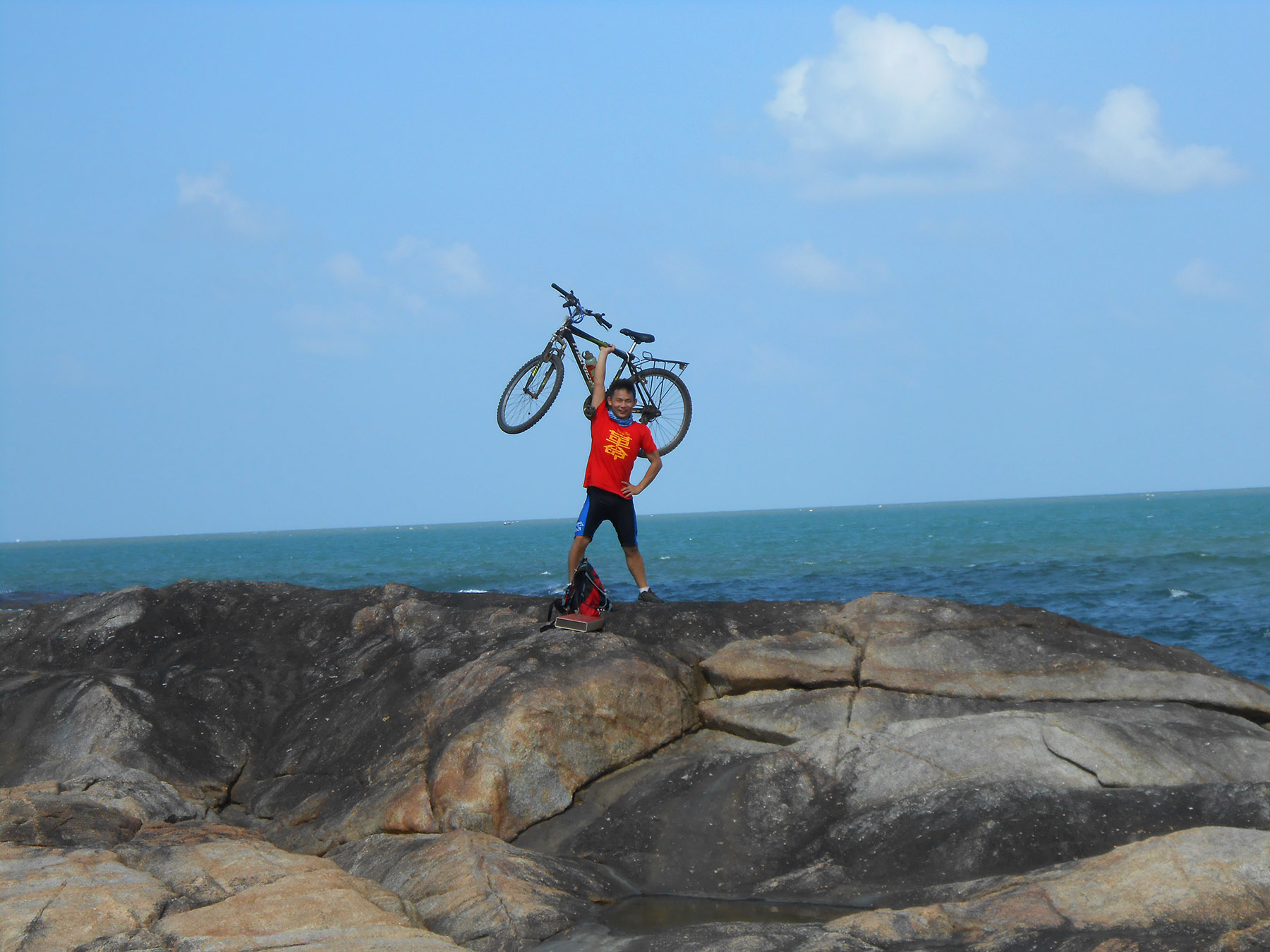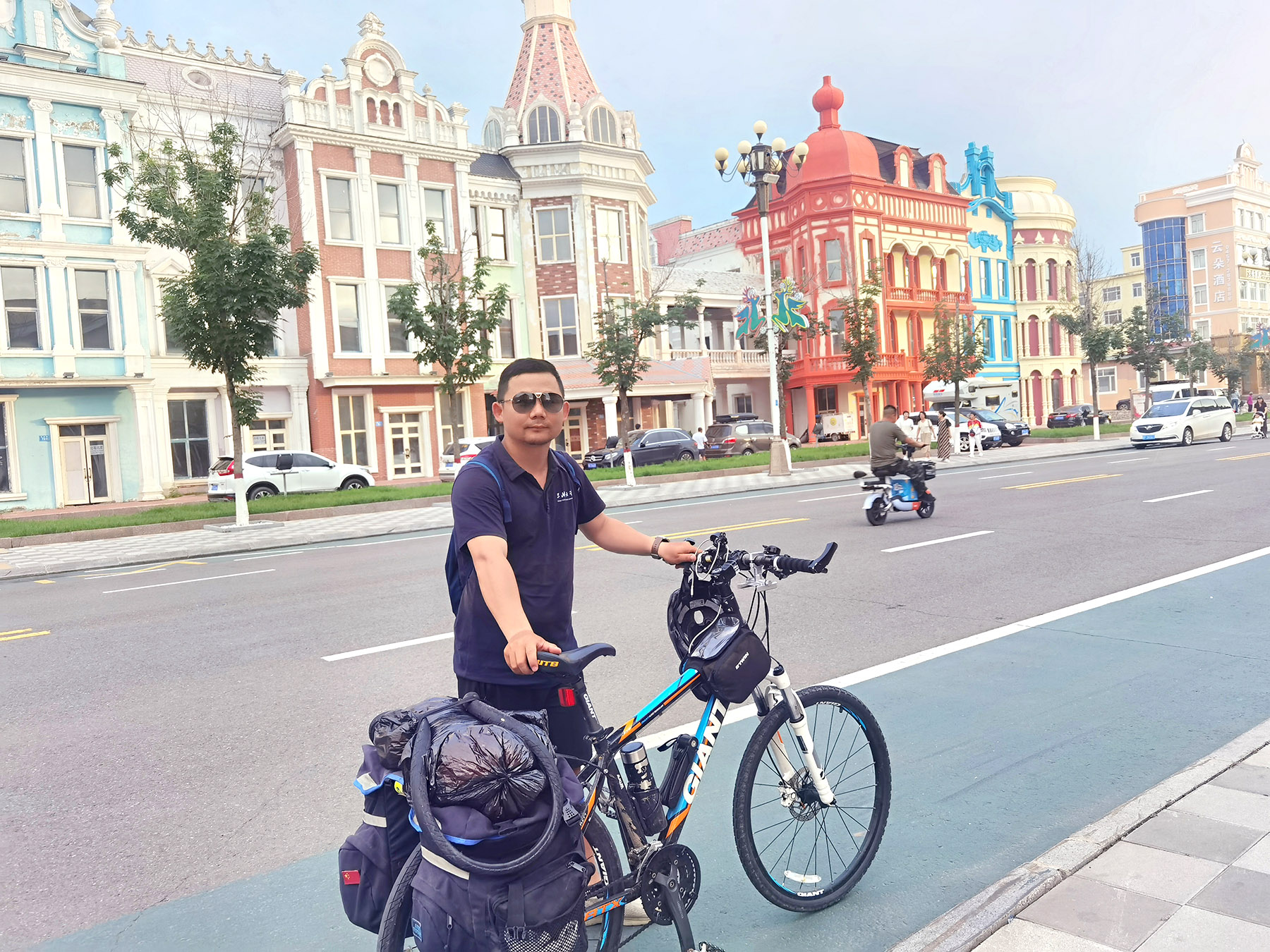Professor has cycled over 10,000 kilometers, bridging academia and adventure

At China Three Gorges University, students often spot a figure striding across campus with a weathered backpack — Wan Xiangqi, a post-1990s professor known as the "cycling scholar".
Over 12 years, he has pedaled more than 10,000 kilometers across China. From the tropical shores of Sanya, Hainan province, to the frozen tundra of Mohe in Heilongjiang province, he has mapped the nation's contours with his bicycle tires while bridging the gap between academia and adventure.
In 2010, as a freshman, Wan stumbled upon The Travel Diaries of Xu Xiake in the library, which struck his heart deeply. He still remembers the declaration of the explorer from the Ming Dynasty (1368-1644) that "a true man should gaze upon the eastern seas at dawn and the western mountains by dusk".
READ MORE: Architect's cycling journey spins his intellectual wheel
Starting with a solo circumnavigation of Hainan island, Wan combined his wanderlust with scientific purpose. Tasked by the National Geological Exploration and Testing Center to collect sand samples for analysis of titanium — a mineral critical to China's defense industry — he spent summers traversing 18 counties, documenting coordinates and environmental conditions.
"Titanium is the backbone of national security," he said, referencing dog-eared copies of China's Mineral Resources Strategy.
Last summer, Wan embarked on his most grueling journey, which was a 6,500-km ride from Sanya to Mohe. He braved rainforests, 4,000-meter-high mountain passes, and the desolate expanses of the Greater Hinggan Mountains. "Every crease on the map holds unknowns," he said, "but Xu Xiake taught me that answers lie on the road," he said.
"Without books, traveling 10,000 miles makes one merely a courier," Wan added, quoting philosopher Wang Yangming from the Ming Dynasty.
His saddlebags always carry texts: The Silk Road guided him through the ancient trade route, while Tibetan Book of Living and Dying lent perspective during his high-altitude rides.
On his Sanya-Mohe ride, historian Qian Mu's Outline of National History became a talisman. "Respect for China's past isn't locked in museums. It flows through our rivers and mountains," he said, echoing Qian's words.

When asked about his toughest challenge, Wan said: "Not the mountains or isolation, but the night before departure."
In June 2022, perched on Sanya's cliffs, he scribbled his fears in the margins of the China Geographic Atlas: "What if I get lost? What if my bike fails? Taking that first pedal stroke is declaring war on fear," he wrote.
That resolve spills into his classrooms. As a Marxist theory lecturer, he once tossed a 200-million-year-old basalt rock which he collected in Mohe onto desks. "This stone witnessed dinosaurs and now sees poverty alleviation. That's history's depth," he told students.
He pairs Ordinary World, a novel of struggle, with field trips to the Loess Plateau. "The rustle of turning pages," he said, "makes me closer to truth than the click of a 'like' button."
Wan's office shelves display relics of his journeys: Hainan coral, Gobi Desert stones, birchbark from Mohe — each tagged with coordinates. His digital archives hold thousands of pages on mineral deposits, dialects and rural transformation. "These will go to the university library," he said. "Maybe a student will find their own courage here."
At a campus lecture last year, he told a rapt audience: "Progress is demanding of those who carry ink-stained books into muddy fields."
Afterward, a freshman clutched a China Geographic Atlas — its cover inscribed by Wan, claiming that the first mile might start with turning this page.
ALSO READ: Cyclists spur cross-Straits harmony
Zhao Chunhua, director of the China Three Gorges University Library, said that Wan truly lives by the principle of "reading ten thousand books and traveling ten thousand miles".
"He masters both the written word and the unwritten lessons of the world — immersing himself in books while exploring the grandeur of China's landscapes. His life is a bridge between scholarship and the soul of our land," Zhao said.
"Through his reading sessions, Wan does more than sharing knowledge. He reveals the power of literature to carry the weight of Chinese culture and the awe of our natural heritage. This is not just education; it's a vivid 'gold-standard ideological lesson' that inspires students to see learning as a journey of mind and spirit," he added.
Contact the writers at weiwangyu@chinadaily.com.cn


